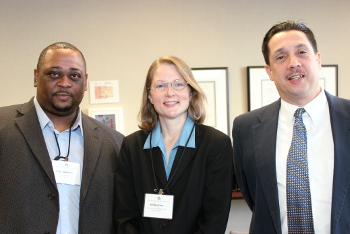
Eric Andrews, Jill Kastner, and Andrew Chevrez before the start of the meeting.
Jan. 29, 2016 – The State Bar of Wisconsin’s Board of Governors today set the amount of nonchargeable dues that members can recoup for FY 2017, and discussed the possibility of developing a voluntary certification program for paralegals in the state.
The 52-member board convened at the State Bar Center in Madison, where it also considered a membership dues policy that would guide the organization’s budgeting process, but ultimately asked the board’s Finance Committee to rework the proposal.
Board Approves Keller Dues Reduction Amount
The board approved a “Keller dues rebate amount” of $7.25 for fiscal year 2017 (July 1, 2016 to June 30, 2017), which is $2 more than the rebate amount for FY 2016.
Under Supreme Court Rule 10.03(5)(b)1, the State Bar may not use compulsory dues of objecting members for activities that are “not necessarily or reasonably related to the purposes of regulating the legal profession or improving the quality of legal services.”
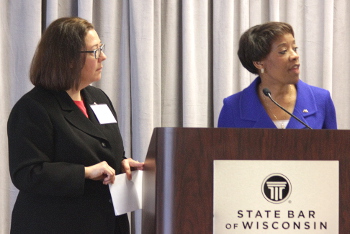
Michelle Behnke, right, and Christina Plum, delegates to the ABA, report on a resolution that will be before the ABA House of Delegates in February.
The State Bar must annually publish notice setting forth each member’s pro rata portion of dues that are not necessarily or reasonably related to these dual purposes. Members may elect to withhold the pro rata portion of nonchargeable dues on dues statements.
Nonchargeable dues are known as the “Keller dues rebate amount,” based on Keller v. State Bar of California, 496 U.S. 1 (1990). In Keller, the U.S. Supreme Court restricted the use of mandatory state bar dues to fund political or ideological activities unless germane to regulating the legal profession or improving the quality of legal services.
Former State Bar President Steve Levine attended the board meeting. He urged the board, as a matter of prudence, to designate all State Bar lobbying expenses as nonchargeable, regardless of whether they fall within the bounds of Keller.
Levine is one of three State Bar members who is challenging the FY 2016 Keller dues rebate amount of $5.25. That matter is going through the arbitration process.
Board Hears Proposal for Voluntary Certification of Paralegals
The board discussed (but did not act on) a proposal for the State Bar to develop and administer a voluntary certification program for paralegals in the state.
Under the proposal, developed by the CLE Committee, individuals would need to earn 18 credits from an ABA-accredited paralegal studies program to be considered a “State Bar of Wisconsin-Certified Paralegal.” In some cases, current paralegals could obtain certification based on work experience, through a “grandfather” mechanism.
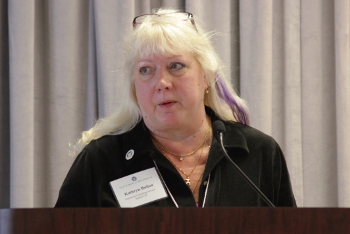
Katheryn Bullon, CLE Committee chair, presents a proposal in which the State Bar would administer a voluntary certification program for paralegals.
There would be a biannual CLE reporting requirement for State Bar-Certified Paralegals, a mechanism to prove good character, and they would be subject to ethical rules modeled on the Rules of Professional Conduct for Attorneys. At all times, only paralegals working under attorney supervision could be State Bar-certified.
Kathryn Bullon, chair of the CLE Committee, said the State Bar has an interest in regulating paralegals, for a number of reasons. For one, supporting the professionalism and training of paralegals will improve the practices of attorneys who hire them, as certified paralegals would be educated on Wisconsin-specific laws and procedures.
In addition, a voluntary certification program would support the State Bar’s obligation to protect the public from the unauthorized and incompetent practice of law, Bullon said.
Bullon noted that other state bars certify paralegals, currently Florida, North Carolina, Ohio, and Texas. Those state bars recognized the growing field of paraprofessionals and took an active role in shaping how they would be regulated, she said.
Other states, including Washington and Utah, have created certification programs that allow legal paraprofessionals to work independently of attorneys. Bullon reiterated that State Bar of Wisconsin-Certified Paralegals would work under attorney supervision.
The State Bar studied this issue extensively in the past, developing rules to establish a regulatory structure. The work of the State Bar’s Paralegal Practice Task Force culminated in a petition to the Wisconsin Supreme Court in 2004, which outlined a paralegal licensing and regulation system that would be court-administered.
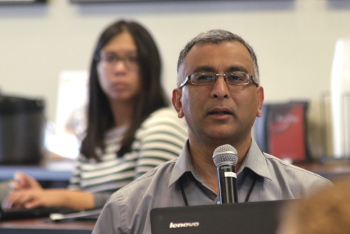
Nilesh Patel comments during the discussion about the voluntary certification of paralegals.
In 2008, the court denied the petition. It said “the prospect of creating an entirely new regulatory and enforcement structure or dramatically expanding existing agencies presents a daunting task in the present economic climate.” However, it invited the State Bar to “consider the merits of a voluntary registered paralegal program.”
The CLE Committee’s tentative proposal does not address how ethical complaints would be handled, or other issues related to certification and renewal periods. Bullon said the committee would continue its work on those issues with board support.
The Paralegal Association of Wisconsin supports a voluntary State Bar-certification program for paralegals, which would promote professionalism, training, and education.
Dist. 3 Gov. Robert Barrington is an adjunct professor in the paralegal program at Madison College, an ABA-approved program. He supported the plan.
“I took this to the faculty, and they asked me to express strong support for this,” Barrington said. “We believe this will give our students a leg up, and give the lawyers that supervise them an additional degree of confidence that they are highly skilled.”
Bullon also said creating a State Bar certification program for paralegals could open the possibility of an “adjunct” membership for paralegals, but that wasn’t explored in depth. The State Bar will revisit the proposal in the future to decide whether to pursue it.
Board Sends Dues Policy Back to Finance Committee
The board considered a membership dues policy establishing a process for regular, predictable dues recommendations to the State Bar’s Finance Committee, which advises the board on finances and annually reviews the proposed budget. Ultimately, the board sent it back to the Finance Committee to address various concerns.
Currently, the State Bar does not have an established policy or process for determining the annual membership dues rate. The last dues increase, in 2015, was the first in 10 years and deemed necessary to preserve and expand existing programs and services.
The proposed policy recommended an annual process to review the dues rate that would be necessary to balance the budget for necessary and desirable programs and services in the event that anticipated operating expenses exceeded operating revenues.
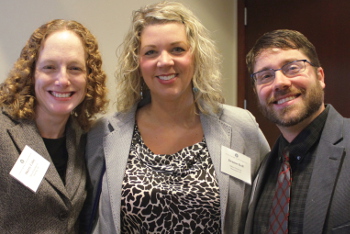
Secretary Sherry Coley, with board members Deanne Koll and Charles Stertz.
“This is called a dues policy, but it’s more of a budget policy,” Kathryn Bullon, a member of the Finance Committee, told the board. “This isn’t about giving anybody carte blanche to say we have more expenses than revenues, let’s raise dues. It’s not about that.”
“If we have shortfalls, we have to take a hard look at slashing expenses without having an adverse impact on the membership. If we can’t find reasonable cuts, we have to figure out where that shortfall is going to come, and we can’t always rely on reserves.”
Bullon said the proposed policy codifies the budgeting process and adds more budgeting predictability. It does not change the process for approving budgets, which must be approved by the Executive Committee and the Board of Governors.
“This allows the board to have the best financial data to make budgeting decisions,” Bullon said. “We’ll be able to see that somewhere down the line, we will have to make those hard decisions. It’s not going to sneak up on us every five, six, or 10 years.”
Other board members raised concerns. Miriam Horwitz, president of the Government Lawyers Division (GLD) and the GLD’s representative on the Board of Governors, said the GLD board urged her to oppose the membership dues policy as written.
 Joe Forward, Saint Louis Univ. School of Law 2010, is a legal writer for the State Bar of Wisconsin, Madison. He can be reached by email or by phone at (608) 250-6161.
Joe Forward, Saint Louis Univ. School of Law 2010, is a legal writer for the State Bar of Wisconsin, Madison. He can be reached by email or by phone at (608) 250-6161.
She said any policy should state more specifically that the State Bar will consider spending cuts and program effectiveness, in addition to all avenues of revenue, before it turns to potential dues increases as a mechanism for balancing the budget.
“The perception that this proposed policy language generates is that it is simply a mechanism to increase dues more progressively over time,” Horowitz said.
The board initially passed the proposal by a 21-20 vote.
After a break, and upon a motion to reconsider from State Bar Secretary and Finance Committee member Sherry Coley, the board voted overwhelming to send it back to the Finance Committee to reconsider language that will address the concerns raised.
“I do think we need a balanced budget policy,” Coley said. “I just don’t want a policy passing by one vote when it comes to how we deal with the budgeting and financing of our organization. We need more support for a policy that dictates our work on budgets.”
Other Business
Former State Bar President Michelle Behnke, the Wisconsin delegate to the ABA House of Delegates, and Christina Plum, the State Bar of Wisconsin delegate to the ABA House of Delegates, appeared to brief the board on a pending ABA resolution.
The resolution establishes Model Regulatory Objectives for the Provision of Legal Services and urges the highest courts of each state, territory, or tribe to consider them when developing a framework for the regulation of nontraditional legal services.
The board approved requests from the Bankruptcy, Insolvency & Creditors’ Rights, the Children and the Law, and the Public Utilities sections to amend their bylaws.
Upon request, interested members may obtain a copy of the minutes of each meeting of the Board of Governors. For more information, contact State Bar Executive Coordinator Jan Marks by email or by phone at (608) 250-6106.
